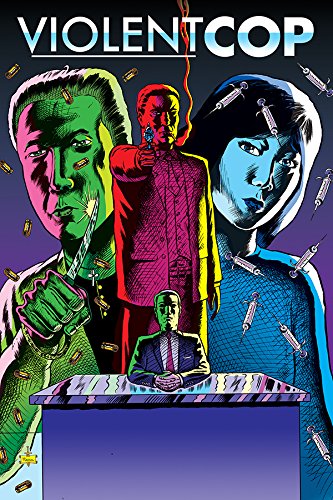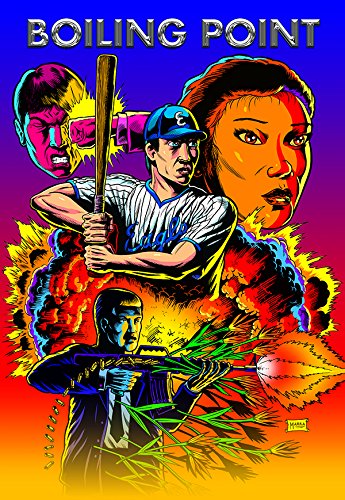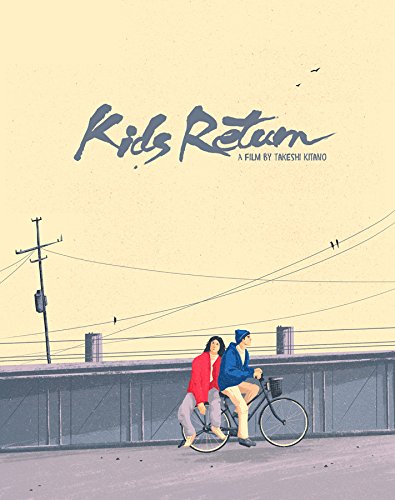Now on Blu-ray: Early Kitanos VIOLENT COP, BOILING POINT and KIDS RETURN
The last year has been great for Kitano Takeshi fans. While the director's recent output hasn't exactly set the world on fire outside of his two Outrage films, home video collectors have encountered a wealth of treasures as his early films have become available on Blu-ray for the first time in 2016.
Most of these features came to us by way of UK specialist label Third Window Films, who've previous released Hana-bi, Kikujiro, Dolls, and A Scene at the Sea, and continue their winning record with Kids Return. However, now there's another label helping to fill in the gaps, Film Movement with their recent releases of Kitano's first two directorial features, Violent Cop and Boiling Point. Are they worth the upgrade? Check out our thoughts below.



In 1989, Japanese comedian Takeshi Kitano burst onto the international film scene with his first work as a director, Violent Cop. The project was originally written and conceived to be directed by legendary underworld auteur Fukasaku Kinji ( Battles Without Honor & Humanity), but when Kitano’s TV shooting schedule interfered with production, Fukasaku stepped away from the project, opening the door for Kitano to take the director’s chair. The result is an incredibly violent and unusual look at Japanese police as an extension of the kind of macho bravado that spawned the yakuza genre with which both Fukasaku and Kitano have become associated over time. It’s a stunning film that not only introduced the world to Kitano, who was largely a local comedy phenomenon in Japan, but also changed the way that the Japanese viewed the actor/director.
Violent Cop , or as its delirious Japanese title says, Sono otoko, kyōbō ni tsuki (That Man, He Is Dangerous), is the story of a renegade cop who goes off the rails in his single-minded pursuit of a particular kind of justice. Crazy cop stories had already been a staple of western genre films for decades, but Japanese films seemed to have been a bit more staid in their portrayal of the men and women (mostly men) committed to maintaining order. When cops did go rogue, for the most part, it’s because the story was focused on the villain and their redemption or revenge. Violent Cop turns the tables and makes the protagonist a largely unsympathetic, but strangely relatable, hot-head determined to gain vengeance for wrongs committed against himself and his family. It’s a bold move, from a script largely rewritten day by day when Kitano came on board, that creates an unforgettable central performance from the actor and his capable supporting cast.
Even though he’s on the proper side of the law in Violent Cop, Kitano was already crafting his iconic on-screen persona with this performance. Kitano has made an acting career of portraying stone-faced villains who bottle up their rage until it reaches a level that can no longer be contained, usually erupting in spectacularly bloody violence. In Violent Cop, his officer-on-the-edge portrayal of Azuma is one of carefully moderated madness. He is constantly needled throughout the film by villains and his own bosses alike, leading him to explode in all directions while attempting to make things right in his own extremely vicious way. It’s a role that Kitano would later layer into his performances as Yakuza bosses and underlings in the years after, and it’s one that he’s very nearly perfected.
Independent US distributor Film Movement, mostly known until now for their monthly DVD club that shares under-the-radar indie films with fans at home, has taken up the challenge of releasing this film, along with Kitano’s follow-up Boiling Point on Blu-ray for the first time anywhere. The result is a solid presentation that represents a demonstrable step up in quality from the available DVD versions of Violent Cop. The presentation isn’t exactly reference quality, but there is a noticeable bump in image quality both in terms of fine detail clarity and color fidelity. The audio presentation is similarly improved with an uncompressed LPCM stereo track that delivers clear, sharp dialogue, and does what it can with one of Kitano’s least compelling background scores. Overall, it’s a definite upgrade from any of the DVD versions previously available.
In order to add a bit of context to the film, Film Movement commissioned a new behind the scenes featurette titled, That Man Is Dangerous: The Birth of Takeshi Kitano. The featurette brings together several key players on the film, with Kitano being noticeably absent, to tell the story of Violent Cop from different perspectives. It’s an interesting look at the film’s production, cramming numerous anecdotes about Kitano’s directing style as well as the daily struggles of the performers to keep up with him on set into a 20 minute overview. I would’ve loved even more, but I’m happy with this. Also included is a booklet with a nice essay from Tom Vick that further contextualizes not only the film, but also Kitano’s unique place in Japanese culture for fans unfamiliar with his work and history.
Violent Cop on Blu-ray is not the kind of visual feast or auditory revelation that we see from bigger, more expensive restorations, but it is a good upgrade from other presently available options that adds context to a film that holds up very nicely 27 years down the road. I wish the cover art weren’t so awful, but it’s a small price to pay (besides, I’ll only ever see the spine on my shelf, so all is well). Recommended.
With Boiling Point, his follow-up to Violent Cop, Takeshi Kitano planted his stake in the ground and announced himself as a serious filmmaker worthy of paying attention to. Boiling Point was Kitano’s second film, released only one year after Violent Cop, but it was his first as a screenwriter rather than a hired gun, and the difference in tone and execution from one film to the next is quite startling. Whereas Violent Cop is a relatively straight forward story told with some unusual acting and scripting choices that make it feel like a special entry in a firmly established genre, Boiling Point is something else altogether. This follow-up is a statement from Kitano that he had his own views of what makes a film successful, and that he would not be beholden to expectation in delivering his own version of a story from the lower levels of organized crime.
Describing the plot of Boiling Point (re-titled for international markets from the far more obtuse3-4X10月 or 3 – 4X October), is a bit tricky as the film is far more free flowing and less linear that Violent Cop. The story focuses largely on Masaki (Yurei Yanagi), an inept member of a local baseball team, whose boss is threatened and attacked by a local yakuza. Masaki travels to Okinawa to purchase some guns to take his revenge on the yakuza and along the way meets up with Uehara (Kitano), a hot-tempered, ill-mannered yakuza who hops along for the ride, inciting all kinds of madness along the way. As the film progresses, Masaki approaches the titular Boiling Point from which he cannot turn back, and a trail of bodies seems to impede his path at every step.
In reality, the film is much less the story of Masaki than it is the story of the tangled web we weave when we endeavor to seek revenge for wrongs committed against us. The film is more of a relay race than a sprint, as the plot gets handed off to one peripheral character after another and we follow a number of smaller, but still connected, subplots. This capricious spirit attached to a violent story is far more in line with the Kitano who has won international acclaim as one of the most well-regarded and easily recognizable auteur talents in the filmmaking world. It’s a scheme that doesn’t quite work here, but develops rapidly in films like Hana-bi, A Scene at the Sea, and ultimately Kikujiro. Viewers familiar with these key works from Kitano will definitely recognize the same type of nascent storytelling style in Boiling Point that blossomed into those later, more successful works.
Boiling Point is obviously not my favorite Kitano film, but it is a necessary stepping stone in his career as a director. The film is like a young man trying on his father’s suit, while technically the measurements may be close, the fit isn’t quite right. You can feel Kitano trying out new ways of expressing himself on film, new tactics that don’t quite work as intended in this first try. The desire to stray from traditional storytelling and verbose screenwriting are particularly strong as Boiling Point goes out of its way to avoid both. However, these experiments would go on to pay great dividends very quickly in Kitano’s career, and for that reason alone it’s worth the effort.
As was the case with Film Movement’s Blu-ray of Violent Cop, this edition of Boiling Point is not exactly reference material, rather a solid upgrade from the previously available discs. Boiling Point improves on visual clarity and color fidelity, but not in a way that will make fans drop their jaws. Audio is similarly improved, leaving this release as the best presently available, which is good enough for me.
Like Violent Cop, Boiling Point gets a making-of featurette (Okinawa Days: Takeshi’s Second Debut) with the participation of the producer, who provides great stories about Kitano’s directing style and the genesis of the project. This set also includes a booklet with an essay from Tom Vick, who further explores the film’s unusual structure and place in Kitano’s career.
Another very good release of a very good film from Film Movement, Boiling Point on Blu-ray is an upgrade that Kitano fans will want in their collections.
The fifth in Third Window Films recent series of early Kitano films on Blu-ray is Kids Return from 1996. After A Scene at the Sea in 1993, made a pair of films that are on opposite ends of his creative spectrum in the yakuza drama Sonatine (now the only major Kitano work without an English friendly Blu-ray on the horizon) and the out-and-out comedy Getting Any?. After Getting Any? He came back to the same type of sprawling narrative that he’d experimented with in A Scene at the Sea and Boiling Point to make a film about a reunion of childhood friends called Kids Return. The circular narrative of Kids Return foreshadows his later more divisive film Dolls, but without the more abstract elements that split critics on the later film.
Kids Return begins as a pair of school friends get expelled following innumerable screw-ups and the pair struggle to find their way in a world without structure. Even though they try to stay together, soon it becomes clear that their paths must diverge in order for either of them to move forward. While one friend finds that he has an innate talent in the boxing ring, the other pursues a less noble life as a mid-level yakuza. Unfortunately for both, their skills in their particular disciplines may be solid, but not exceptional enough for them to move beyond their prescribed station in life and they find themselves floundering in their own inability to convert talent into true success. Just when they begin to lose faith in themselves, the pair reconnect and reignite the bond that held them fast as kids.
Kitano is nothing if not a filmmaker willing to stretch his films to meet his own desires and challenge his audience. In Kids Return he does just that. While the film is a middling effort among his oeuvre, it maintains the sense of freedom that makes Kitano’s work stand out. The film maintains two largely independent storylines without much trouble at all, and in the instances in which the storylines intersect, it always feels quite natural.
Kids Return is one of many explorations of the exuberance of youth in Kitano’s career, it seems to be one of his greatest thematic interests, and frankly, one of the themes with which he’s most successful. The ennui of the rudderless young man in Japan, almost a societal sin in a country which prizes ambition, is a fruitful ground for Kitano, and some of his best films, like A Scene at the Sea, take place in this world. In what I would consider Kitano’s heyday – the period starting with Violent Cop and ending around Zatoichi – Kids is a pretty minor effort, however, seen as a part of his larger filmography, it remains relatively strong.
Third Window Films brings Kids Return to Blu-ray in a lovely new edition. I hadn’t seen the film previously on DVD, but I was quite happy with the presentation of the film, as I have been with all of Third Window’s Kitano Blu-rays. This disc includes a brand new audio commentary track from Aaron Gerow, which is informative, but a bit too academic for my tastes with more dead spots than I’m accustomed to. Also included is a twenty minute making-of featurette that talks with a couple of the actors from the film, mostly Kaneko Ken. It’s an interesting watch that gives further context to each of the films as all three featurettes include great discussions of Kitano’s working habits, even if he’s not present in any of them.
It should come as no surprise that even though I’m rather lukewarm on Kids Return specifically, I give this Region B UK Blu-ray from Third Window Films a solid recommendation.

More about Violent Cop
More about Boiling Point
Around the Internet
Recent Posts
Friday One Sheet: LIVING THE LAND
Now Playing: BLADES OF THE GUARDIANS and Some Other Movies
Leading Voices in Global Cinema
- Peter Martin, Dallas, Texas
- Managing Editor
- Andrew Mack, Toronto, Canada
- Editor, News
- Ard Vijn, Rotterdam, The Netherlands
- Editor, Europe
- Benjamin Umstead, Los Angeles, California
- Editor, U.S.
- J Hurtado, Dallas, Texas
- Editor, U.S.
- James Marsh, Hong Kong, China
- Editor, Asia
- Michele "Izzy" Galgana, New England
- Editor, U.S.
- Ryland Aldrich, Los Angeles, California
- Editor, Festivals
- Shelagh Rowan-Legg
- Editor, Canada









